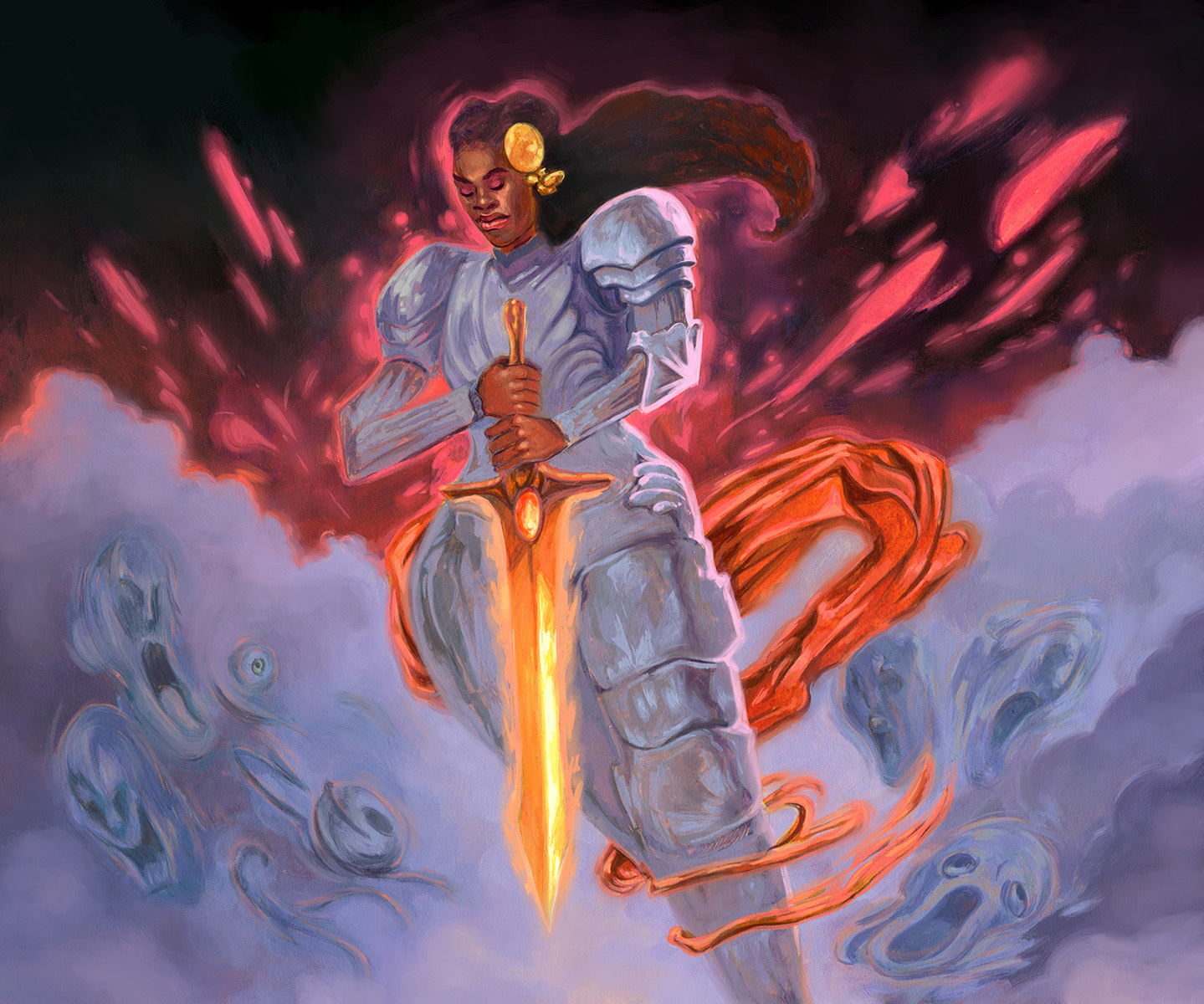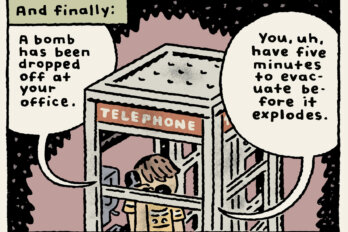Listen to an audio version of this story
When the teaser for The Lord of the Rings: The Rings of Power, a new Amazon Prime series, was released on YouTube in February, an interested party heading to the comment section would have come up against a wall of repeated text. Over and over, in English, Polish, and Russian, thousands of comments read: “Evil cannot create anything new, it can only spoil and destroy what good forces have invented and created.” Each of these thousands of comments attributed this awkwardly phrased statement to J. R. R. Tolkien. Spoiler alert: it’s widely believed to be a misquote.
It’s not without irony that a group of self-anointed Tolkien purists crusading for textual accuracy have played fast and loose with facts. Their imagined antagonists, be they the showrunners or casting agents, are purportedly spoiling and destroying something good, the commenters felt. How? Apparently by casting people of colour.
Featuring Ismael Cruz Córdova as an elf, Sophia Nomvete as a dwarf, Cynthia Addai-Robinson and Nazanin Boniadi as human characters, and Lenny Henry as a harfoot (an ancestor to the hobbits we’ve seen before), among several others, the new streaming series is bringing some of the first actors of colour to Tolkien adaptations—after six live-action films that went without, save for a few extras. In advance footage and within the first few episodes, it was made clear that these are meaningful roles in the ensemble cast.
Beneath assertions of fandom pride and purity seethes a maelstrom of abject racism. The now-deleted YouTube comment barrage is one strand in a much larger web of backlash, diligently stoked by subgroups of fans that seem hell-bent on tanking the series.
While it’s long been present, the racism in groups of pop culture fans online has rapidly gained coordination and sophistication in recent years. Behind-the-scenes planning has allowed relatively small minorities of users to flood online spaces. These campaigns go beyond seemingly trivial internet chatter and have the power to shape the future of projects, the careers of BIPOC actors, and the film and TV industry as a whole.
The Lord of the Rings, the first instalment of which was published in 1954 and which was adapted as a series of three live-action films from 2001 to 2003, is profoundly beloved by fans and critics alike, and the film iterations are widely regarded as some of the greatest book-to-screen adaptations of all time. In the two decades since, we’ve seen a smorgasbord of fantasy film and TV content, with still more book series, graphic novels, comics, and short stories around them: HBO’s juggernaut Game of Thrones and its successor House of the Dragon, Amazon’s new adaptation of the beloved series The Wheel of Time, Netflix’s The Witcher, and newer entries Shadow and Bone and The Dragon Prince.
Peter Jackson’s The Lord of the Rings trilogy remains a linchpin of the genre. Since the announcement that Amazon’s new Tolkien adaptation would hit screens in September, the series has understandably faced heightened scrutiny for whether it can live up to what came before. But, instead of comparisons between the sweeping landscapes, epic battlegrounds, or heart-wrenching dialogue, the divergence that has drawn the most ire from enraged fans doesn’t stem from admiration for the classic tale and its themes.
Before plot points or scenes could be released, criticisms of the adaptation’s accuracy immediately fixated on the cast not matching the presumably all-white image the disparagers projected on the source text. One YouTube comment, with hundreds of likes, said the series is a “direct attack” on Tolkien’s cultural heritage and the “inextricable” roots of European culture that “no fantasy has ever been able to replicate.” Racist jokes about slavery, diatribes about activism, and complaints about women “acting like men” abounded.
Digging further into the origins of the comment brigade leads one to other forums, where users cheer one another on. With over 1,000 participants, one page openly discusses the inferiority of nonwhite people and endlessly complains about the casting. Chillingly, one commenter writes that they are waiting for a series where “an epic ethnic cleansing takes place.”
On numerous occasions in the real world, Tolkien’s work has been co-opted by neo-Nazis. John Cameron Denton, the former leader of a neo-Nazi terror group, Atomwaffen, requested supporters send Tolkien-related material to his prison cell. Other white nationalists online have taken The Lord of the Rings as fodder for Aryan fantasies. It appears that the European-inspired aesthetic present in the films, alongside fantasy tropes featuring “pure” species of elves and “corrupt” creatures like orcs, is ripe for white-nationalist imaginations—it doesn’t help that in Tolkien’s books, good characters commonly have fair skin and evil ones are associated with non-European features or darker skin.
Now, The Rings of Power has become a massive target for white supremacists. For them, Tolkien’s world is a Holy Grail, the archetypal fantasy that they seem to perceive as the last bastion of whiteness in the genre. Beneath surface-level use of the language of fandom are outright calls for the violent elimination of people of colour.
For the fans who don’t subscribe to the racist and misogynistic rhetoric, those clamouring voices are a source of dismay, antithetical to the works they know and love. Anna María is a UK-based actor, community organizer, and self-described armchair Tolkien expert who was first introduced to the series at the age of seven. “Bigotry hurts more when it comes from a space you once associated only with joy,” she writes in an email.
“Seeing racist comments (and facing some myself) from fellow Tolkien fans . . . is infinitely more personal and hurtful. I know it makes me—and many of my friends—feel decidedly unwelcome in the fandom.”
It’s not that Anna María doesn’t want to critique the new series. Many fans of the source material may have apprehensions about reviewing or assessing the show seriously for fear of adding to the existing tide of racism. “It’s just such a distraction,” she says.
The racist activity isn’t unique to Tolkien, nor is it indicative of all fantasy fans. Those subscribing to white-supremacist ideologies have wormed their way into countless fan communities. From Middle-earth to the galaxy far, far away, what makes fandom such a target for coordinated bigotry?
“Fandom spaces are often perceived to be avenues of escape from ‘real life,’” says Rukmini Pande, an associate professor in literary studies at O. P. Jindal Global University in India and an editorial board member of Mallorn: The Journal of Tolkien Studies. But racist activity in fandom, Pande says, is just an extension of the world outside.
Paul Booth, a professor of media and cinema studies at DePaul University in Chicago, echoes the idea, noting that it’s “a sign of the polarization and toxicity in our culture writ large.” Though fan groups have often come together in positive ways, such as banding together to bring cancelled shows back for renewal, he says, “What we’re seeing in the social media era is that a lot of the fans that are coming together are doing it in a toxic way.”
It’s a pattern that takes root in fandom spaces over and over, from Star Wars to the Marvel Cinematic Universe and beyond. Over the past few years, major franchises have made concerted efforts to diversify their casts and crews, and viewers of colour have begun to see themselves reflected in blockbuster stories. But alongside this shift comes an increase in coordinated online bigotry.
Many are familiar with the gargantuan backlash to the recent Star Wars films, particularly The Last Jedi (2017). One of its stars, Kelly Marie Tran, was the first woman of colour to play a major role in a Star Wars movie. She was bullied off her social media accounts by fans. Men’s rights activists even created their own version of the film, edited down to forty-five minutes, with most of the -female characters removed.
“It’s not like this is a majority of followers. It’s a very vocal minority,” Booth says. “But they feel like they are the keepers of Star Wars. They’re the ones who have authority because they’ve been fans forever and it’s not the Star Wars that they grew up with.”
Recent steps forward for inclusive casting in the Marvel Cinematic Universe have been met with similar coordinated strategies. This year’s Ms. Marvel web series, focusing on Pakistani American superhero Kamala Khan (played by Markham, Ontario, actress Iman Vellani), was one of the studio’s most critically acclaimed series yet. But, even prior to its release, it was review-bombed—flooded with one-star user ratings on IMDb, the online film and TV database, by trolls with clear malicious intent.
Review bombing has the power to change a viewer’s first impression of a show or film—before they even decide to watch. It massively skews the average rating, giving audiences a negative impression from the first search result. Once potential viewers are repelled, negative consequences abound; eventually, it can decrease a show’s chance of renewal.
With The Rings of Power, racist groups began their attacks even earlier, flooding social media on the release of a teaser image featuring the hands of a Black actor. Previously, efforts like this started in the aftermath of the show’s release. Now, they’ve intensified and adapted to the point where racist fan subgroups can seriously impact online perception of a project months before its release.
Some of the most vocal detractors of The Rings of Power generate hate through videos, without needing to explicitly mention race. They let their visuals do the talking, referring to the series as an “abomination” and more while zooming in on trailer clips of the BIPOC actors.
“Voices that point out patterns of racist behaviour are often accused of spoiling the fun of others and shut down,” says Pande. “Such ideas also gain traction under the guise of ‘free speech’ or ‘creative expression’ where critique is equated with attacking someone’s fannish interests.”
In a study conducted on tweets that tagged director Rian Johnson following The Last Jedi’s release, researcher Morten Bay found that data didn’t support claims that “most fans” were dissatisfied with the film. The study found that a significant percentage of negative Twitter interactions involved trolls, political activists, and bots—automated social media accounts that mimic real users and can be programmed to artificially amplify other accounts or content. Bay wrote that the presence of “deliberate influence measures” like these indicated an attempt to manipulate the broader Star Wars fandom as a political-persuasion tactic, noting the same misinformation mechanisms were used in antivaccination campaigns and the 2016 US election.
As an actor herself, Anna María worries for the actors of colour who have the opportunity to play roles in The Rings of Power. She imagines being cast in a project like this to be “the biggest of all big breaks, the most wondrous dream come true.”
“Then, I imagine what it would be like for that ultimate triumph to be twisted by thousands and thousands of strangers — all because some brown folks are portrayed in a world where dragons are real.”
It’s not an unfounded fear. After the profound racist backlash Tran faced for her role in The Last Jedi, her character was practically written out of the next film. In 2019’s The Rise of Skywalker, she appeared for barely over a minute.
But, despite the efforts of online trolls, much of the Tolkien fandom welcomes the inclusive casting and hopes to judge the series on its own merit. Don Marshall runs a TikTok channel dedicated to The Lord of the Rings, with over half a million followers. He’s known for his videos engaging with the Tolkien realm, like the one that maps the real-world duration of Frodo and Sam’s journey to Mordor. Marshall believes the backlash to the casting in the name of textual accuracy contains a sort of “manufactured outrage.”
He says the “so-called purists” that are fixated on the diversity of the cast are missing the bigger picture. “The entire trilogy is about groups of people from different races coming together.”
The casting choices that supposedly differ from the original text don’t alter his enjoyment of the adaptation. “The books will always be there. They are the foundation for this entire community, this entire world that Tolkien built.” Everything beyond that, he says, is “icing on the cake.”
Cheryl Thompson, an assistant professor at Toronto Metropolitan University’s School of Performance, questions beliefs that inclusive casting somehow alters history. In reality, she says, what some believe about history has been -influenced by what those in power have chosen to portray visually over the past century of cinema, which has largely not been diverse.
“They are clinging to this version of the truth that’s actually been curated for them. And then when you change something about that curated version of the truth, they get all up in arms about it,” says Thompson.
“Whenever you insert a racialized figure into that state, people think, ‘Oh, they’re rewriting history,’” she says. “Meanwhile, you’re actually probably telling a more accurate history than what’s been presented to us.”
A key concern for those watching shows targeted by racist online harassment is how those in power might respond. If a tidal wave in the comment section results in a lead actor being downgraded to a passing shadow, hate groups gain validation.
In the weeks since The Rings of Power’s first few episodes were released, it was made clear that it might not be that easy. In an apparent effort to quell the tide of offensive comments, Amazon suspended reviews of the series for seventy-two hours, potentially enough time to weed out some of the trolls.
When fans call back to original material and older content as a justification for racism and harassment, what might be more powerful is action from the very source they revere. Following the release of The Rings of Power, lead actors from the original movie series spoke out on social media. In a photo posted on Elijah Wood’s Twitter profile, with the Rings of Power account tagged, he stands with Dominic Monaghan and Billy Boyd; the three played Frodo, Merry, and Pippin.
Together, they each wear a piece of Marshall’s merchandise featuring a line of elf ears and human ears in varied skin tones. Above, in Tolkien’s elvish script, Tengwar, the shirts read: “You are all welcome here.” Sean Astin, who played Sam, posted a photo of himself wearing a matching hat.
It may be just as difficult as getting the “one ring to rule them all” off a covetous wearer’s finger, but the solution lies in rejecting racist fans’ claims to power. It’s a feeling embodied by the Rings of Power cast’s official statement released online.
“Our world has never been all white, fantasy has never been all white, Middle-earth is not all white,” it reads. “BIPOC belong in Middle-earth and they are here to stay.”





